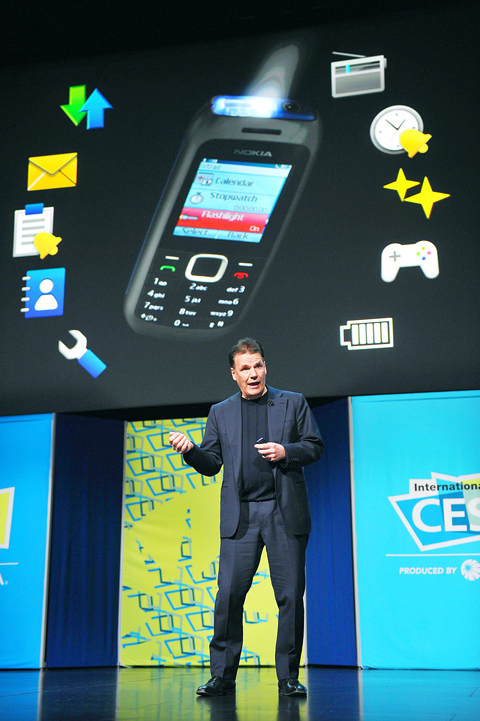Nokia chief executive Olli-Pekka Kallasvuo praised the mobile phone on Friday as a history-changing tool and challenged developers to create programs for poor countries.
“These little devices have done more to improve people’s lives than perhaps any technology in history,” the head of the Finnish mobile phone giant said in a keynote address at the Consumer Electronics Show in Las Vegas.
The Nokia CEO said relatively cheap mobile phones had done much to improve the lives of people in developing nations.

PHOTO: AFP
“Here is the Nokia 1616, nothing to get too excited about,” he said. “[But] it includes a built-in flashlight, a dust resistant keypad, an FM radio, a speaking alarm clock.”
“Farmers in India and Indonesia can use it to get the latest information on crops,” Kallasvuo said. “The mobile device has become a necessity for upward mobility. For the majority of the world’s people, their first and only access to the Internet will be through a mobile device — not a PC and this access is spreading very, very fast.”
Kallasvuo said there were 4.6 billion mobile subscriptions among a global population of 6.8 billion people.
“We are near the day where we can talk about the whole connected world,” he said.
He also announced that Nokia was putting US$1 million behind the first “Nokia Growth Economy Venture Challenge” to encourage developers to design mobile products or services that raise the standard of living in poor nations.
“We want you to come up with new and innovative ways to help people,” Kallasvuo said.
“We’ve seen what the tech community can do when it focuses on problems that are also opportunities,” he said. “We want to channel that energy toward improving lives in the developing world.”
Nokia said the Venture Challenge is not limited to software or hardware that uses its devices or software platforms. The million dollars will be invested in the organization with the best idea with the winner announced in June.

Authorities have detained three former Taiwan Semiconductor Manufacturing Co (TMSC, 台積電) employees on suspicion of compromising classified technology used in making 2-nanometer chips, the Taiwan High Prosecutors’ Office said yesterday. Prosecutors are holding a former TSMC engineer surnamed Chen (陳) and two recently sacked TSMC engineers, including one person surnamed Wu (吳) in detention with restricted communication, following an investigation launched on July 25, a statement said. The announcement came a day after Nikkei Asia reported on the technology theft in an exclusive story, saying TSMC had fired two workers for contravening data rules on advanced chipmaking technology. Two-nanometer wafers are the most

DEFENSE: The first set of three NASAMS that were previously purchased is expected to be delivered by the end of this year and deployed near the capital, sources said Taiwan plans to procure 28 more sets of M-142 High Mobility Artillery Rocket Systems (HIMARS), as well as nine additional sets of National Advanced Surface-to-Air Missile Systems (NASAMS), military sources said yesterday. Taiwan had previously purchased 29 HIMARS launchers from the US and received the first 11 last year. Once the planned purchases are completed and delivered, Taiwan would have 57 sets of HIMARS. The army has also increased the number of MGM-140 Army Tactical Missile Systems (ATACMS) purchased from 64 to 84, the sources added. Each HIMARS launch pod can carry six Guided Multiple Launch Rocket Systems, capable of

CHINA’s BULLYING: The former British prime minister said that he believes ‘Taiwan can and will’ protect its freedom and democracy, as its people are lovers of liberty Former British prime minister Boris Johnson yesterday said Western nations should have the courage to stand with and deepen their economic partnerships with Taiwan in the face of China’s intensified pressure. He made the remarks at the ninth Ketagalan Forum: 2025 Indo-Pacific Security Dialogue hosted by the Ministry of Foreign Affairs and the Prospect Foundation in Taipei. Johnson, who is visiting Taiwan for the first time, said he had seen Taiwan’s coastline on a screen on his indoor bicycle, but wanted to learn more about the nation, including its artificial intelligence (AI) development, the key technology of the 21st century. Calling himself an

South Korea yesterday said that it was removing loudspeakers used to blare K-pop and news reports to North Korea, as the new administration in Seoul tries to ease tensions with its bellicose neighbor. The nations, still technically at war, had already halted propaganda broadcasts along the demilitarized zone, Seoul’s military said in June after the election of South Korean President Lee Jae-myung. It said in June that Pyongyang stopped transmitting bizarre, unsettling noises along the border that had become a major nuisance for South Korean residents, a day after South Korea’s loudspeakers fell silent. “Starting today, the military has begun removing the loudspeakers,”